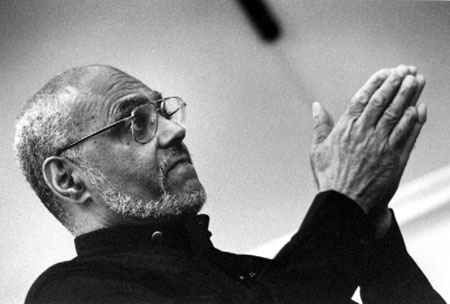
Dear ASALH Members and Friends:
 It is difficult to comprehend the death of a hero/the loss of a living legend/the seeming end to an individual who represents something much bigger than one person. For many of us who went to college in the 1960s, Bob Moses epitomized the heroic, vanguard role of the Student Nonviolent Coordinating Committee (SNCC) in the South and especially the Mississippi voter registration drive known as Freedom Summer 1964. Charismatic yet selfless, brilliant yet humble, Bob Moses inspired courage in the face of white violence and calm in the face of chaos. He recognized and never failed to acknowledge the wisdom and leadership skills of the voteless Black sharecroppers he worked with and learned from, such people as Fannie Lou Hamer and many others.
It is difficult to comprehend the death of a hero/the loss of a living legend/the seeming end to an individual who represents something much bigger than one person. For many of us who went to college in the 1960s, Bob Moses epitomized the heroic, vanguard role of the Student Nonviolent Coordinating Committee (SNCC) in the South and especially the Mississippi voter registration drive known as Freedom Summer 1964. Charismatic yet selfless, brilliant yet humble, Bob Moses inspired courage in the face of white violence and calm in the face of chaos. He recognized and never failed to acknowledge the wisdom and leadership skills of the voteless Black sharecroppers he worked with and learned from, such people as Fannie Lou Hamer and many others.
Bob Moses, like John Lewis, will be remembered as one of the giants of the civil rights movement—the voice of a youthful generation that came of age through protest activism that would eventually open doors of opportunity, once denied to Black people by state-sanctioned segregation and voter disfranchisement laws. He understood well the step-by-step nature of struggle, as can be seen in his words of gratitude to Northern supporters in a letter, dated February 27, 1963, in which he described the empowering impact of food sent by them to impoverished and illiterate Black Mississippians. The food drive provided a teaching and mobilizing moment for racially oppressed men and women who were told to “combat your own fears about beatings, shootings and possible mob violence; you stymy, by your mere physical presence.” As a result, in Greenwood, MS, “Negroes who couldn’t read or write,” asserted Moses, “stood in line to tell the registrar they still wanted to vote, and that they didn’t have a chance to go to school when they were small and anyway Mr. John Jones [white] can’t read and write and he votes.” [Joanne Grant. Black Protest (2nd ed., 1996)]
Bob Moses will forever stand as a symbol of the Sixties generation that struggled vigorously for equality and justice in the heat of the southern sun. However, today, in the third decade of the twenty-first century, his generation has reached its own twilight time, when also sadly Black voting rights are once again imperiled. How, then, do we come to grips with the death of this hero? The answer lies in the timeless message and meaning of his life. We honor Bob Moses by continuing to vote and to stymy current disfranchisement tactics by our mere physical presence at the polls.
Sincerely,

Evelyn Brooks Higginbotham
ASALH National President
